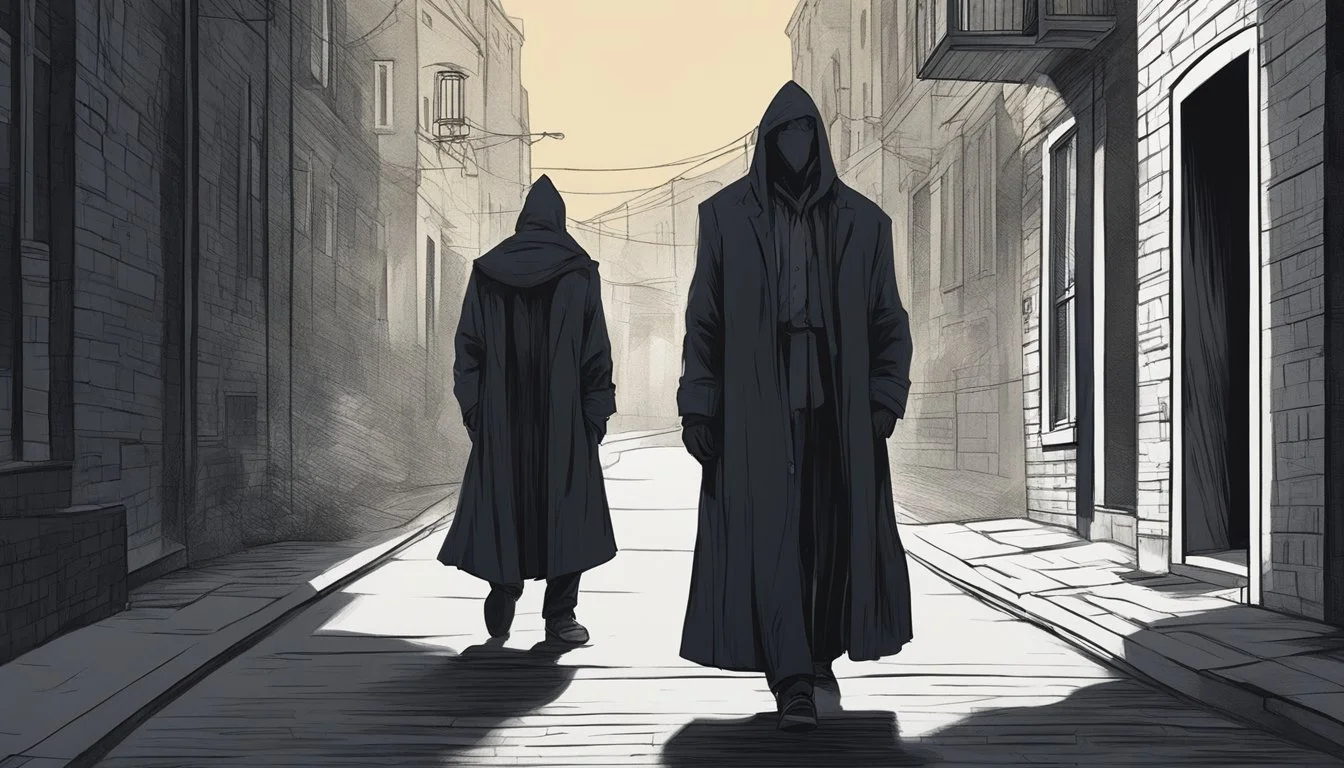Anthony Allen Shore: 5 Chilling Documentaries on the Tourniquet Killer
Unveiling the Twisted Mind of Houston's Serial Killer
Anthony Allen Shore, known as the "Tourniquet Killer," terrorized Houston, Texas in the 1980s and 1990s. His brutal crimes and eventual capture have been the subject of numerous true crime documentaries. These films explore Shore's dark psychology, his horrific methods, and the devastating impact on his victims and their families.
Shore's story serves as a chilling reminder of the evil that can lurk behind a seemingly normal facade. The documentaries examining his case offer viewers a chance to understand the complexities of serial killer investigations and the lasting effects of such heinous acts on communities. They provide insight into the mind of a murderer while honoring the memories of those whose lives were tragically cut short.
1) The Mind of a Monster: Analyzing the Tourniquet Killer
This documentary delves into the psychology of Anthony Allen Shore, the notorious Tourniquet Killer. It examines Shore's troubled childhood and the events that may have shaped his criminal behavior.
Experts analyze Shore's modus operandi, focusing on his use of handmade tourniquets to strangle his victims. The film explores how Shore managed to evade capture for years while living a seemingly normal life as a telephone repairman and family man.
Interviews with law enforcement officials provide insight into the investigation that ultimately led to Shore's arrest in 2003. The documentary also features chilling excerpts from Shore's confessions, revealing the thought processes behind his heinous crimes.
Viewers gain a deeper understanding of the complexities of Shore's personality, including his musical talents and charismatic nature. The film raises questions about the nature of evil and the factors that contribute to the making of a serial killer.
Through careful analysis, this documentary offers a disturbing glimpse into the mind of Anthony Allen Shore, shedding light on one of Houston's most infamous criminals.
2) Deadly Obsession: The Life and Crimes of Anthony Shore
Anthony Allen Shore, known as the "Tourniquet Killer," terrorized Houston, Texas from 1986 to 2000. He murdered four females, ranging in age from 9 to 21 years old.
Shore's signature method involved using a tourniquet-like device to strangle his victims. This unique technique led to his infamous moniker.
His crimes went unsolved for years until DNA evidence linked him to the murders in 2003. Shore confessed to the killings upon his arrest, providing chilling details of his actions.
The documentary explores Shore's troubled background and the factors that may have contributed to his violent behavior. It delves into his family life, relationships, and occupation as a telephone technician.
Interviews with law enforcement officials, forensic experts, and family members of the victims offer insights into the investigation and the impact of Shore's crimes on the community.
The film examines Shore's dual life as a family man and secret serial killer, highlighting the shock his loved ones experienced upon learning of his dark side.
3) Serial Psyche: Inside the Mind of the Tourniquet Killer
"Serial Psyche: Inside the Mind of the Tourniquet Killer" offers viewers a chilling glimpse into Anthony Shore's disturbing psyche. This documentary delves into the psychological factors that shaped Shore's criminal behavior.
Experts analyze Shore's childhood experiences and personal history to understand the origins of his violent tendencies. The film explores how Shore's intelligence and outwardly normal appearance allowed him to evade capture for years.
Shore's dual nature as both a father and a killer is examined in depth. The documentary highlights the shocking contrast between his public persona and his secret life of violence.
Interviews with investigators and psychologists provide insights into Shore's motivations and modus operandi. The film also touches on the impact of Shore's crimes on his victims' families and the community.
"Serial Psyche" presents a disturbing yet compelling portrait of a complex criminal mind. It serves as a stark reminder of the dangers that can lurk beneath seemingly ordinary exteriors.
4) Chronicles of Darkness: Anthony Shore's Reign of Terror
"Chronicles of Darkness: Anthony Shore's Reign of Terror" is a gripping documentary that explores the heinous crimes committed by Anthony Allen Shore in Houston, Texas. The film delves into Shore's background and the events that led to his transformation into the notorious Tourniquet Killer.
The documentary meticulously examines Shore's modus operandi, focusing on his use of tourniquets to strangle his victims. It presents a timeline of his crimes, starting with the 1992 murder of Maria del Carmen Estrada, whose body was found in a Dairy Queen drive-thru.
Interviews with law enforcement officials, forensic experts, and family members of the victims provide a comprehensive look at the investigation. The film also explores how Shore managed to evade capture for over a decade before DNA evidence finally linked him to the murders.
"Chronicles of Darkness" offers a chilling portrayal of Shore's double life as a telephone repairman and family man by day, and a ruthless killer by night. It examines the psychological factors that may have contributed to his violent behavior.
The documentary concludes with Shore's arrest in 2003 and his subsequent confession to multiple murders, providing closure to the families of his victims and the community of Houston.
5) Psychopath Unmasked: The Tourniquet Killer's Tale
"Psychopath Unmasked: The Tourniquet Killer's Tale" offers a detailed look into Anthony Allen Shore's crimes and psychology. This documentary features interviews with law enforcement officers and forensic experts who worked on the case.
The film examines Shore's troubled childhood and his progression into a serial killer. It explores the psychological factors that may have contributed to his violent behavior and his ability to maintain a seemingly normal facade.
Viewers gain insight into Shore's modus operandi, including his use of tourniquets to strangle his victims. The documentary also covers the investigation that led to Shore's arrest in 2003, more than a decade after his first known murder.
The film includes archival footage and reenactments to illustrate key moments in Shore's life and crimes. It presents a comprehensive timeline of events, from his early offenses to his eventual execution in 2018.
"Psychopath Unmasked" provides a chilling portrayal of Shore's crimes while attempting to understand the mind of a serial killer. It serves as both a true crime documentary and a psychological study of a convicted murderer.
Background on Anthony Allen Shore
Anthony Allen Shore, known as the "Tourniquet Killer", was a serial killer who terrorized Houston, Texas in the late 20th century. His crimes and eventual capture revealed a disturbing pattern of violence and sexual abuse spanning over a decade.
Early Life and Psychological Profile
Shore was born on June 25, 1962, in Rapid City, South Dakota. He displayed musical talent from a young age, playing in local bands. Despite his outward charm, Shore harbored dark tendencies.
As an adult, he worked as a telephone repairman, earning the nickname "Telephone Tony" among friends. Shore was married and had two daughters, presenting a façade of normalcy to his community.
Psychological assessments later revealed Shore's sociopathic traits and lack of empathy. These characteristics likely contributed to his ability to compartmentalize his heinous acts while maintaining a seemingly ordinary life.
Criminal Activities and Convictions
Shore's known criminal activities began in 1986 and continued until 2000. He targeted young women and girls, using a tourniquet-like device to strangle his victims.
His first documented murder was in 1992 when he killed 21-year-old Maria del Carmen Estrada. Shore dumped her body behind a Houston Dairy Queen.
DNA evidence ultimately led to Shore's arrest in 2003. He was convicted of Estrada's murder and confessed to three additional killings.
Shore's modus operandi involved sexual assault followed by strangulation using a ligature tightened with a toothbrush or bamboo stick. This earned him the moniker "Tourniquet Killer".
On January 18, 2018, Anthony Allen Shore was executed by lethal injection for his crimes.
Impact on Society and Criminal Justice System
Anthony Allen Shore's crimes and subsequent conviction had far-reaching effects on Houston and beyond. His case highlighted weaknesses in investigative procedures and influenced public perceptions of safety.
Changes in Law Enforcement Practices
Shore's ability to evade capture for years exposed flaws in DNA evidence processing. This led to improved protocols for handling genetic material at crime scenes. Police departments across Texas implemented more rigorous training on evidence collection and preservation.
The case also prompted increased collaboration between jurisdictions. Law enforcement agencies began sharing information more readily to identify patterns in violent crimes across city and county lines.
Additionally, Shore's crimes highlighted the need for better tracking of registered sex offenders. Texas legislators tightened regulations on monitoring and reporting requirements for convicted sex offenders after their release.
Public Perception and Media Attention
Shore's crimes and trial garnered significant media coverage, both locally and nationally. This intense scrutiny raised awareness about the prevalence of sexual predators in communities.
Many Houston residents reported feeling less safe, particularly in areas where Shore's victims were found. Community watch programs saw increased participation in the aftermath of his arrest.
The case also sparked discussions about the death penalty. Shore's execution in 2018 reignited debates on capital punishment's effectiveness as a deterrent for violent crime.
Media portrayals of Shore's victims prompted conversations about how missing persons cases are handled, especially those involving marginalized individuals. This led to calls for more equitable treatment in investigations and news coverage.


